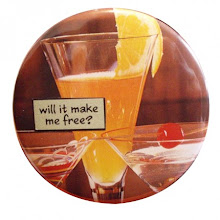(continued from here)
Political correctness is a hot topic here in the Ulpan. By my lights, it’s incredibly important to spend class time developing a politically-sensitive ear, because Hebrew's ֿsemantic [mine]field is studded with complicated and potentially hurtful connotations.
For example, people here use two different words for Palestineans: “falestinim” and “falestinayim.” I’ve heard that among younger Hebrew speakers, the first pronunciation connotes support for the Palestinian people, whereas the second pronunciation is either neutral or negative in connotation. The city-name of Haifa does a similar sort of thing. Some speakers use the original Arabic pronunciation (which sounds very close to the English). Others use the Hebrew-ified version: “chey-fa.” You can probably guess what pragmatic payloads those pronunciations tow.
Students in advanced Ulpan classes need to learn able to control the allegiances expressed by our word choices. But it’s not always clear how to do so. Sometimes my American political awareness serves me well: I have no problem saying מאיותגר (challenged) instead of מפגר (retarded) — and, indeed, avoiding both of them and using a more specific word if I can.
But often enough, my political conscience seems to misfire. For example, Hebrew uses adjectives that express group membership as singular nouns to refer to individual people — “that Sephardic” — and as plural nouns to refer to groups — “those Filipinos.” In English, I would absolutely never use an expression like “that Black,” or “those gays.” In Hebrew, even conscientious leftists seem to regard those expressions as wholly unproblematic — just like “that Muslim” or “those Americans.” (And even there, I prefer “that Muslim guy” or “those American tourists.”)
It gets worse. “Those Filipinos” are only sometimes an ethnic group. Hebrew also uses “Filipino” to refer to anyone who takes care of elderly people in private homes, regardless of their race. Apparently, an overwhelming majority of Filipino residents of Israel work in those sorts of caretaking jobs, and conversely, occupants of those jobs are overwhelmingly of Philippine descent. Modern Hebrew has evidently integrated that trend right into the lexicon. Problematic? (!)
Here's another example. I asked one of my cousins how to say “queer” in Hebrew. His first suggestion was הומו (“homo”) — a word that leaves out most of the queer spectrum, especially when you consider that only men can be “homo-im” here. Then he suggested LGBT. (In Hebrew, that comes out as a pronounceable acronym: להב"ט (“lahabt”). But it still doesn't include plenty of the gender identities and sexual identities included under the queer umbrella. And what's more, it doesn't do well as a label for an individual. It makes sense to talk about a lahabt movement or march or support group, but an individual can only be הומו, לסבית, טרנס/ית או ביסקסואל/ית.
And that doesn't even begin to touch the issues arising from Hebrew's gendered grammar, or the taxonomic mess of its racial/ethnic/national terminology. More on that tomorrow.
Stanford prison study - how moralizing destroys science
-
A recent inquiry argues that the famous Stanford prison study was faulty
and scientifically invalid.
It in an example of how missing moralizing in science...
7 years ago




My question re: queer-related Hebrew is, how do you say 'straight'? I've heard 'straitim' but no feminine equivalent nor a singular form. There's an article I remember liking a lot called "Dancing on the Needle's Edge: Gay Lingo in an Israeli Disco" that I read in a book of Myles' about globalization and gay language and actually analyzes contemporary queer poetry in Hebrew as well as the titular disco-speak.
ReplyDeleteAlso, I didn't know the two pronunciation of Palestinians had ideological connotations, and I associate the stress of the second syllable in Haifa with older people (which I guess mostly fits what you said).
This is similar to my own adventure of learning colloquial Egyptian Arabic. Apparently there are a few different words for gay. One is simply 'gay,' which is considered the most neutral, although it is strictly masculine. There is otherwise no variation of 'gay' for women, politically neutral or otherwise. Apparently it is not possible for women to be gay and Arab Egyptian at the same time.
ReplyDelete"overwhelming majority of Filipino residents of Israel work in those sorts of caretaking jobs"
ReplyDeleteDo you think it is always problematic for a word to be both an ethnic group and an occupation, or just when the occupation is the stereotypical occupation for members of the ethnic group? So if Filipino people were primarily known for being computer programmers, would you still find the two meanings (care taker and member of ethnic group) "problematic"?
Given the realities of language evolution and in light of the (I would say) widely discredited Sapir–Whorf hypothesis, what do you think should be done about words that you think are "problematic" in this way?
While both “falestinim” and “falestinayim" exist, their meaning is exactly the same.
ReplyDeleteYou are correct that "'Hai-fa" is in principle Arabic whereas "chey-'fa" is Hebrew, however in daily speach I think "chey-'fa" is more formal; those in the know would say "'Hai-fa".
"Queer" is transliterated to "קוויר", but unlike "הומו" and "לסבית", this word is less common in the general public. LGBT is להט"ב (lahatab).